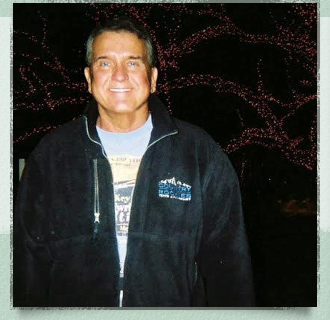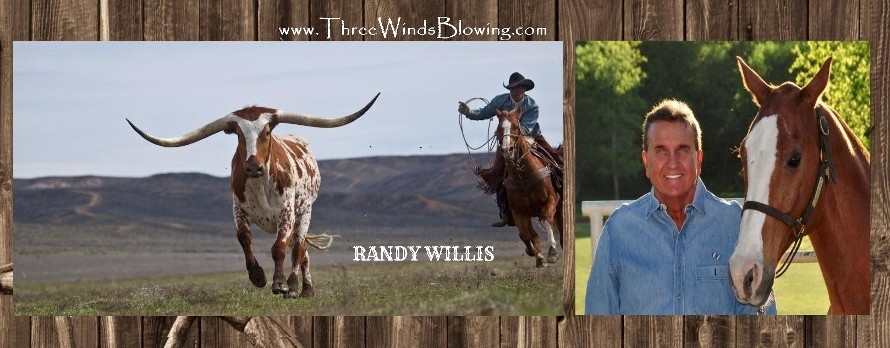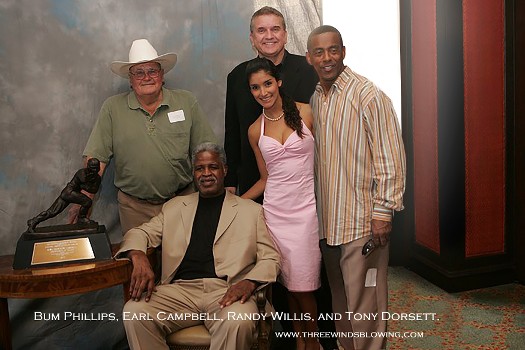Randy Willis is an American novelist, biographer, rancher, and music publisher.
Randy Willis is the author of Destiny, Carolinas Wind, Twice a Slave, Three Winds Blowing, Louisiana Wind, Beckoning Candle, The Apostle to the Opelousas, The Story of Joseph Willis, and many magazine and newspaper articles.
Randy Willis...novels about adventure, family, faith, and the character of men and women that touched generations.
I've learned much from seeing the world through the eyes of my grandchildren, for you know, it is written, "the kingdom of heaven belongs to such as these." ~ Randy Willis
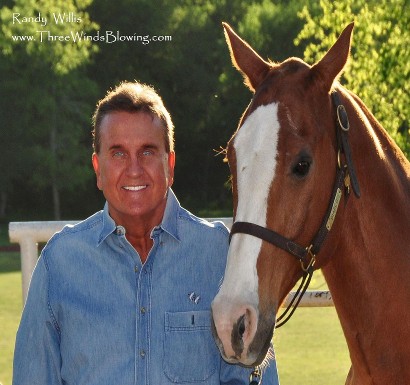
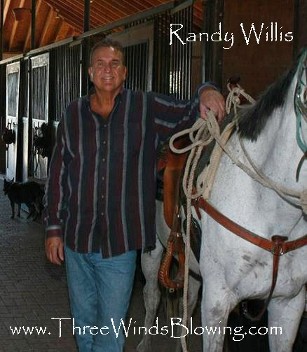
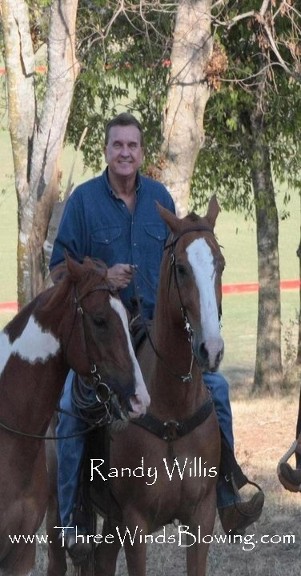
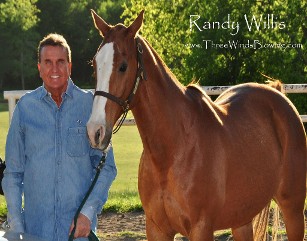
Josh Willis, Adam Willis, Randy Willis & Aaron Willis
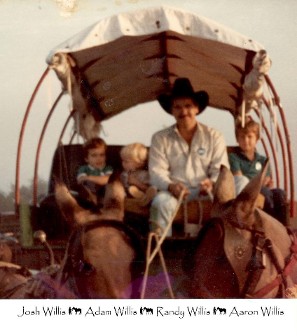
Randy and Josh Willis

|
|
|
June 1853
Steamboat Paul Jones
Two fathoms deep
Mississippi River, near Natchez
Joseph Willis had turned ninety-five in 1853. He decides to see the sights along the Mississippi River one last time. His swimming the mighty river on a mule-days are long since passed. This time he will travel on the Steamboat Paul Jones from Natchez to Baton Rouge. A cool breeze breaks up the unrelenting sun. Joseph places a wet towel around his neck to relieve the heat.
The steamboat passes another one loaded with convicts. Joseph sits on the main deck next to a seventeen-year-old boy whom the leadsman called Samuel. They both are watching the colossal paddle wheel churning the muddy waters when the boy turns to Joseph. "How do they navigate in these shallow waters? It looks unsafe!"
Before Joseph can answer, the leadsman throws a knotted rope overboard and yells, “Half twain! Quarter twain! M-a-r-k twain!"
"What does that mean, Mister?" The boy crosses his arms while pushing his glasses up.
Joseph leans forward. "It means it’s the second mark on the line, two fathoms—twelve feet deep. That’s the safe depth for this steamboat. We're in safe waters now."
Samuel waves an offering of thanks to the leadsman. He also opens up to Joseph, explaining how his father died of pneumonia when Samuel was eleven and how he dreamed of being a steamboatman.
“Tell me more, Samuel.”
“I wasn’t expected to live when I was born. My brother and sister had already died of childhood diseases. Mother said God spared me because He had plans for me. She made me remember Bible verses. I washed that down with Shakespeare and read everything I could. Mother insisted I never throw a card or drink a drop of liquor, although I did occasionally slip off and smoke my corncob pipe.
“I figured no one was perfect. That is, until a late night thunderstorm convinced me that God wanted me to mend my ways, so I put my pipe aside. My righteousness did not last long, for I developed an aversion to slavery. Our local pulpit said it was in the Bible that God approved of it. It was a Holy Institution.
"After seeing a dozen men and women chained together to be shipped down the river, I determined that the church and I worshipped a different God. Those slaves had the saddest faces I’d ever seen, and the slave traders were human devils. My Father never laughed, yet he never was as unhappy as those slaves. It all made me want my dream even more.”
"Tell me about that dream?"
Samuel’s eyes sparkle. "When I was a lad living on the banks of the Mississippi, in Hannibal, I could see the steamboats go up and down the river. I wanted to ride one. One day a big steamer moored up at our little town—this was my chance. After all, I’d already fished away the summer.
"The steamboat advertised it was a 'lifeboat'—I reckoned that meant it was safe and would provide the time of my life. I reckoned wrong—at least about the safe part! It was the kind of lifeboat that wouldn't save anybody.
"I became overjoyed to be on a real sure-enough steamboat, enjoying the motion of the swift-moving craft until it commenced to rain. When it rains in the Mississippi country, it rains. The rain drove me to cover. I realized it was not a lifeboat when the rain was almost my demise. I thought I would die as the red-hot cinders from the big stacks came drifting down and stung my legs and feet. Would I ever see my home again?
"For some reason, Mama's supper came to my mind. I expressed my desire to get off that boat. They put me ashore in Louisiana. I finally made it back home.
“Mister, please excuse me if I was a little edgy when the leadsman yelled mark twain. I thought it meant something bad."
"Just the opposite, son." With a slow smile, Joseph assures him they are safe.
Samuel raises his thick eyebrows. “Where you headed?”
“Only as far as Baton Rouge,” Joseph mutters, fanning himself from the heat with one hand. “Seven thousand people have died this year in N’Orleans from the yellow fever epidemic. I want to go to Heaven—but not today. Baton Rouge is far enough.”
“Your story of the lifeboat wrongly advertised reminds me of Louisiana's Governor Johnson.”
“How’s that, Sir?” Samuel asks, scratching his head.
“The good Governor got the great state of Louisiana to build the state prison in Baton Rouge. I’m considering visiting those inmates we passed earlier and tell ‘em about a real lifeboat.”
"What kind of boat is that, Mister?" Samuel gazes at Joseph.
"One built many years ago by a feller named Noah. His boat was mark twain, too—safe from the dangers that lurked in the murky waters below. That boat had no helm, for it was not guided by human hands."
“I love a good story, Sir. I fancy myself as a storyteller. Would tell me the rest of it?”
"Be glad to. God told Noah He was going to destroy the Earth because of its wickedness. But, God was also going to provide a way of protection from His judgment. The Lord told Noah to build a boat—a boat of safety, if you will. The Good Book says Noah found grace in the eyes of the Lord. That was the first time that word appeared in the Bible. Noah received the unmerited favor of God. Grace provided deliverance from the Lord’s judgment.
“Now there was a lot to be done. The Lord told Noah to build the boat out of gopher wood. We call it cypress in Louisiana. It will not rot in our lifetime.
“’Put pitch on the inside and outside too,’ the Lord insisted. The word pitch in the Hebrew means atonement. We need to be in Jesus just as Noah needed to be in that boat. As the storms of God’s wrath beat upon the ship, the winds of God’s wrath would later beat upon the Lord Jesus. If we are on the inside, not one drop of judgment can come through. We are sealed with that atoning pitch—Christ's atoning blood.
“It took Noah more than 100 years to build it. It takes a lot of faith in the Lord's promise to do that. The boat was built like an ancient coffin. There was no steamboat pilot to guide it—only God.
“The Lord gave precise instructions. ‘Set the door of the boat in its side.’ There was only one door to pass through to escape God’s judgment. Jesus is that one door.
"By faith, Noah and his family entered the boat. Once they were all inside, the Lord shut the door. God sealed the door—not Noah. ‘Put a window in the top of the boat, Noah, so you can look to Heaven for all your needs.’
“God had Noah build rooms in the boat. There is a room for me. There is room for you—for the asking.
"Noah's boat floated many days. It finally landed on Mount Ararat on the seventeenth day of the seventh month. That’s our April 17th—the same day Jesus rose from the grave. Noah went into the boat with little, but when he came out, the entire world was his."
"What is your name, Mister?"
"Joseph Willis."
"You should be a preacher."
Joseph smiles at the irony of that statement. "Grace provides our Salvation. Grace provides our Savior. Grace provides our security—grace keeps us. But, we all must choose to put our trust or not to put our trust in God's ark of salvation—Jesus. There's still room in that ark of safety.”
“I reckon Heaven goes by favor.” Samuel exhales. “If it went by merit, we would stay out, and our dogs would go in.”
“That’s a clever way to put it. You should be a writer.”
Joseph Willis died in 1854, at age ninety-six in his beloved Louisiana. Forever in the ark of salvation—Christ.
*****
#destiny by #randywillis
Destiny is a powerful epic with love stories, battles, testimonies, drama, politics, history, and even humor.
The sweeping family saga spans four centuries.
Inspired by true stories.
Available now at https://www.amazon.com/dp/1733567402

|
|
|
|
8/11/16 |
One of my favorite novelist...Lew Wallace
|
One of my favorite novelist, Lewis Wallace, was inspired to write his second novel, in 1880, by an agnostic. The novel was conceived after sitting on a train, listening to Colonel Robert Ingersoll for two hours.
Wallace wrote that Ingersoll poured out "a medley of argument, eloquence, wit, satire, audacity, irreverence, poetry, brilliant antitheses, and pungent excoriation of believers in God, C...hrist, and Heaven, the like of which I had never heard."
Until then, Wallace had been indifferent to the claims of Jesus. He wrote, "Yet here was I now moved as never before, and by what? The most outright denials of all human knowledge of God, Christ, Heaven... Was the Colonel right? What had I on which to answer yes or no? He had made me ashamed of my ignorance: and then--here is the unexpected of the affair--as I walked on in the cool darkness, I was aroused for the first time in my life to the importance of religion... I thought of the manuscript in my desk. Its closing scene was the child Christ in the cave by Bethlehem: why not go on with the story down to the crucifixion? That would make a book, and compel me to study everything of pertinency; after which, possibly, I would be possessed of opinions of real value."
Wallace subtitled the book, a tale of the Christ. He later wrote, "It only remains to say that I did as resolved, with results — first, the book Ben Hur, and second, a conviction amounting to absolute belief in God and the Divinity of Christ."
~ Randy Willis
|
|
8/21/16 |
Twice a Slave | Randy Willis Author |
Twice a Slave has been chosen as a part of the Jerry B. Jenkins Select Line along with four bestselling authors. Jerry Jenkins is author of more than 180 books with sales of more than 70 million copies, including the best-selling Left Behind series.
The son of a white man and a Cherokee, Joseph Willis must live as a slave on his own property. After his father gives him his freedom on his deathbed, an angry uncle prevents his emancipation and confiscates his property.
His struggle for freedom is complicated by a love forbidden by society and his new found spiritual faith. Declaring himself a slave to Jesus Christ, he experiences an eternal freedom no man or government can suppress - and challenges most men would flee.
With a faith molded by tragedy, Joseph finds the courage to forgive - and to change the course of a new nation.
The journey of Joseph Willis from North Carolina to Louisiana is filled with intrigue and inspiration. It describes the struggles of Native American slavery and the profound impact that Joseph Willis made on the newly acquired Louisiana Territory.
The story of Joseph Willis begins at the close of the First Great Awakening in America and ends at the height of the country's Second Great Awakening.
It illustrates the faith of a person of low social stature and how his simple faith changed the course of Louisiana history. The story captures the hardships of early Evangelical leaders and the inspiration of the manner in which they overcame great obstacles.
Joseph Willis lived as a slave two times - the first time because of injustice thrust upon him, and the second time because of the love of God that captured his heart and soul. It's an untold, yet unforgettable story.
Twice a Slave has been chosen as a part of the Jerry B. Jenkins Select Line along with four bestselling authors. Jerry Jenkins is author of more than 180 books with sales of more than 70 million copies, including the best-selling Left Behind series.
***************************************
About Joseph Willis
Joseph Willis' life is a story of triumph over tragedy and victory over adversity!
. He was born into slavery. His mother was Cherokee and his father a wealthy English plantation owner.
. His family took him to court to deprive him of his inheritance (which would have made him the wealthiest plantation owner in all of Bladen County, North Carolina in 1776).
. He fought as a Patriot in the Revolutionary War under the most colorful of all the American generals, Francis Marion, The Swamp Fox.
. His first wife died in childbirth, and his second wife died only six years later, leaving him with five small children.
. He crossed the mighty Mississippi River at Natchez at the peril of his own life, riding a mule!
. He entered hostile Spanish-controlled Louisiana Territory, when the dreaded Code Noir (Black Code) was in effect. It forbade any Protestant ministers who came into the territory from preaching.
. His life was threatened because of the message he brought to Spanish-controlled Louisiana!
. His own denomination refused to ordain him because of his race.
. Joseph Willis preached the first Gospel sermon by an Evangelical west of the Mississippi River.
. On November 13, 1812, Joseph Willis constituted Calvary Baptist Church at Bayou Chicot, Louisiana. He went on to plant over twenty churches in Louisiana.
. October 31, 1818, Joseph Willis (and others that had followed him from the Carolinas) founded the Louisiana Baptist Association, at Beulah Baptist in Cheneyville. Joseph had founded all five charter member churches.
. After overcoming insurmountable obstacles, he blazed a trail for others for another half-century that changed American history.
. His accomplishments are still felt today.
Randy Willis is a fourth great-grandson of Joseph Willis and his foremost historian. |
|
|
Without Louisiana College there might not have been "Sunshine."
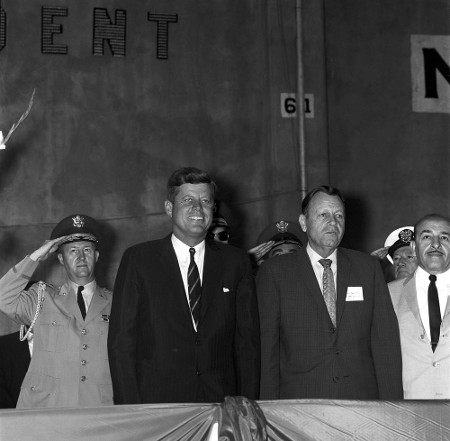
|
When I was a boy one of my heroes was the man standing to the right of President John F. Kennedy. I had a gracious letter that he had written to my mother after her first husband had prematurely died. When I entered the entertainment business there were only two famous people, in that world (there were many in the sport's world) that I wanted to meet. One was Roy Rogers and the other was him. Years later I was invited by a friend, who was his band leader at the time, to meet him in his home. ~ Randy Willis
I wrote this about him. Without Louisiana College there might not have been "Sunshine."
Perhaps I should explain in more detail. Without Louisiana College there may never have been the classic hit song "You Are My Sunshine. "
The year was 1920. The son of a poor sharecropper from the now-ghost town of Beech Springs in north Louisiana decided he wanted to get an education. His family was so poor that he did not have a bed in which to sleep until he was nine years old.
Upon graduation from high school, he began the task of choosing a college. One of his neighbors had something called a college catalogue. Later he would recall, “I was amazed and believed you could order a college just as you ordered something from Sears. I’d never seen a college, had never been on a college campus, but I read it and it told all about Louisiana College at Pineville. I decided that’s where I would try to go.” The college had been established just fourteen years before in 1906.
But how could he pay for tuition, books, housing, and food? He didn't have any money or know anyone that did. He decided to try and get a job at the college. On his second day on campus he went to the college employment office and found a job in the soon to be named Hattie B. Strother Cafeteria. Hattie was the beloved Dean of Women of Louisiana College. She would serve as Dean of Women for 21 years. Hattie Strother's maternal great-grandfather, Joseph Willis, had preached the first sermon by an Evangelical West of the Mississippi River, but it would be a decision by her brother that would forever change Louisiana history.
Hattie's brother, Willie Strother, was a history professor at Louisiana College. He would teach there for 35 years. The young sharecropper's son would attend his classes. He wished to get his degree in history. It would also be during the student's freshman year that a classmate of his and Willie and Hattie's brother, Harry Winfield Strother, would die from injuries in a football game at Louisiana College.
After acquiring the job in the cafeteria he joined the glee club. Professor Dunwoody soon assigned him to the college quartet. He sang lead. About the same time he received a gift, a used guitar. He taught himself how to play it. As winter approached he became desperate for money. With his guitar, he began to sing on the street corners in Alexandria. When an officer would tell him to move on he would move to another street corner.
The young student's name was Jimmie Davis. He would graduate from Louisiana College, earning a bachelor's degree in history in 1924 and in 1927 a masters degree from Louisiana State University. He would become a two-time governor of Louisiana and record one of America's best-loved songs, " You Are My Sunshine. " He was inducted into six halls of fames, including the Country Music Hall of Fame, the Southern Gospel Music Association Hall of Fame, and the Louisiana Music Hall of Fame.
But none of this would have happened had it not been for two encounters on the campus of Louisiana College. In his third year of college Jimmie simply just did not have the money to continue. He tried banks for a loan. They all turned him down. Later, he would write, "Everyone ought to be hungry and try to borrow money at least once in their life. To be broke and turned down, well, it's something."
With his dreams put on hold the college boy found himself in back of a mule again, plowing and picking cotton from sunup to sundown . Jimmie made $75 and supplemented that by slipping back into Alexandria and singing on street corners. After one year in the cotton fields he was able to return to Louisiana College and obtain his degree in history when Willie Strother loaned him $120 (the equivalent of $1,500 today).
But, there would be yet another encounter on the campus of Louisiana College that would have a greater impact on Jimmie's life. While walking across campus a man introduced himself to Jimmie. The stranger was striking looking, well dressed, and friendly. Jimmie said, "At first we talked about football and baseball." He was the son of a sharecropper too.
Then he began to ask Jimmie questions and explained who he was. "I'm Robert G. Lee . I'm holding a revival in Pineville tonight and you're invited." Dr. Lee had served as pastor of First Baptist Church of New Orleans for four years. The bold and future three time president of the Southern Baptist Convention (and future pastor of Bellevue Baptist Church in Memphis) added, "Jimmie, can I ask you something? If the Lord would call you today, would you be ready to go." Jimmie replied, "Dr. Lee, I hope He doesn't call me today because I don't think I could make it." Dr. Lee replied, "The Lord's been good to you, and it's something you ought to think about." He closed by saying, "I hope you'll come to church tonight."
Jimmie later wrote, "I realized that everything I had, everything I had ever had, and everything I would ever hope to have on this earth had come and would come through the grace of God."
Jimmie continued, "That night I went to church. Dr Lee gave one of his most famous and beloved sermons, Pay Day, Some Day. There's no doubt of it, the man had the finest command of the English language that I have ever heard. Before he had finished, I was ready to go down the aisle. And when he gave the invitation, I was the first one down and made public my profession of faith and united with that church." Willie Strother was there. He was a deacon in the church.
Jimmie would write of his beloved college, "Every man needs God as a partner because you can't make it by yourself. I knew it was my duty to try and contribute something to life, not just take from it, and I determined to try to be a better citizen. I believe that was the most important thing I learned at Louisiana College."
Jimmie Davis would go on to change Louisiana history and impact the lives of thousands through his music and life. In 1999, "You Are My Sunshine" was honored with a Grammy Hall of Fame Award and the Recording Industry Association of America named it one of the Songs of the Century.
"You Are My Sunshine,” was designated an official state song of Louisiana in 1977.
The Sunshine Bridge was completed in 1963 over the Mississippi River between Baton Rouge and New Orleans. Governor Davis named it after his signature song. His horse was also named Sunshine.
Governor Davis died in his sleep peacefully at his Baton Rouge home on November 5, 2000. He was 101 years old and had continued to make public appearances until a few months before his passing.
~ Randy Willis
Website: www threewindsblowing com
Amazon author's page: http://amazon.com/author/randywillis
Bibliography: Jimmie Davis's papers can be found at the Louisiana State Archives, in Baton Rouge, Louisiana. An obituary appears in the New York Times, 6 Nov. 2000. An uncritical biography is Gus Weill's You Are My Sunshine: The Jimmie Davis Story, an Affectionate Biography (1977). Davis's first term of governor is well covered in Jerry Purvis Sanson's Louisiana during World War II: Politics and Society, 1939-1945 (1999). |
|
9/5/16 |
Randy Willis, Jake Willis and John Wayne |
I'm in the mood for a fast horse or a slow train and they're no trains in sight! ~ Randy Willis
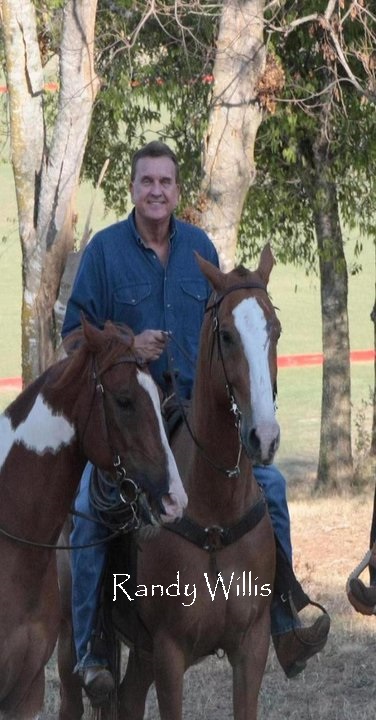
John Wayne, Jake Willis, my Quarter Horse Dollar—and yes, me. This scene, more than any other in the movies, reminds me of my Dad, Jake Willis...!
After watching my favorite John Wayne movie, Big Jake, for the umpteenth time, I've decided it's time for a ride. Dollar and my destination is the Guadalupe River near Sisterdale. There, hopefully, I will write a chapter or two on a nov...el that I'm working on.
Big Jake has always reminded me of my Dad, Jake Willis. Dollar was named after two different horses, Dollor and Dollar, that John Wayne rode in his final westerns. The horses are often confused. It is Dollor that carries Wayne when he makes his famous charge, reins in his teeth, in his Oscar-winning portrayal of Rooster Cogburn in True Grit. And it's Dollar that Wayne rides in the sequel, Rooster Cogburn, as well as in his final film, The Shootist.
Vaya con Dios
~ Randy Willis
Beckoning Candle is my new book that will be released in 2017. It is based upon my father Julian "Jake" Willis's life and my namesake, my grandfather, Randall "Ran" Willis's life. It is a nonfiction novel (i.e.: the story of actual people and actual events told with the dramatic techniques of a novel). Truman Capote claimed to have invented this genre with his book "In Cold Blood" (which I read many years ago). I will keep you updated with the release date.
|
|
1/9/17 |
Randy Willis and Jake Willis |
It’s 16 degrees this mornin’ at my home. When I was fetched up (between Angleton and Danbury) the first thing on my mind on a morning like this was the livestock. Nothing’s changed, the livestock is still the first thing on my mind. If needed I will saddle up, but I hope it’s not needed!
photo: My Dad Jake Willis and me. It was 17 on that morning.
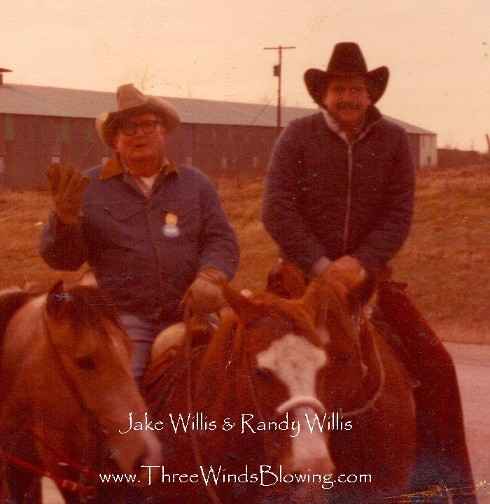
|
|
|
Randy Willis | A Christmas Story |
A Christmas story inspired by actual events.
***
Excerpted from Three Winds Blowing (Epilogue) by Randy Willis
Christmas Day, December 25, 1852, Forest Hill, Louisiana
Great-Grandpa Joseph Willis relived much of his life in Louisiana on the wagon trip in October of 1852 from Evergreen to Babb’s Bridge. He poured out his heart to us, and I discovered a joy in writin’ and keepin’ an account of all his stories.
Just when it seemed that no day in our family would ever top the 1845 Willis Feast of Thanksgiv…ing…it did. It all begin the first time ever I saw a white Christmas, December 25, 1852, in Babb’s Bridge, and the entire family was there. Each family member brought a decoration for our tree. The cedar was so big that we had to cut it down three times just to get it inside the door. There were strings of popcorn, wooden figures, sugared fruit, paper dolls cut out by the girls, gingerbread, and somebody even brought a bird’s nest. We had ornaments that had meanings, too, like a pine tree, which symbolized eternity, pinecones that meant warmth, and a teapot that signified hospitality, which has always been taught by our family. There were candy canes with the Good Shepherd’s crook, with white stripes for the purity of Jesus and his virgin birth and the bold red stripes for Christ’s shed blood. At the top of the tree was the star of Bethlehem made from a quilt. And, the Christmas stockin’s stuffed with nuts, candy, and fruit hung on every available nail.
I’ll never forget the looks on my cousins’, brothers’, and sisters’ faces. Dolls, books, tablets, pencils, wooden soldiers, and even a rockin’ horse were unwrapped that happy morn. I got a new writin’ tablet that I started using to write this.
Christmas Day started with a few flurries, and everyone ran out to see the snow. Mother taught us to make something I’d never eaten before—ice cream. She showed us how to add milk, cream, butter, and eggs with the snow in a pewter pot. She had read where President Thomas Jefferson had even made ice cream with split vanilla beans. Imagine that! Our traditional hot spiced cider warmed us from the cold. The smell of roasting chestnuts in Mama’s cast-iron skillet in the fireplace brought back precious memories of Christmas past.
As the flakes began to fall steadily, more guests arrived, including Mr. Cormier and Miss Adelaide. She was with child, due in a few months. Mr. Cormier told Great-Grandpa, “If the baby is a boy, we are gonna name him Joseph.” Great-Grandpa’s face shone with an all-knowin’ peace. You could hear the excitement in their voices as Mr. and Mrs. Cormier brushed the snow off.
Mr. Malachi Perkins, Miss Eliza, Randall, and Emily came in together. Mr. Perkins went right up to Great-Grandpa and gave him a hug, sayin’, “Pastor, we consider ourselves engaged, but as you know by Louisiana law, we can’t get married. We’ve fallen in love, and if it was legal, we’d be hitched already.” He hesitated, then went on, “We so want to do what’s right in the eyes of the Lord. I remember ya tellin’ me how your mama and daddy had a clandestine weddin’. I don’t want to bother ya on this special day, but would ya mind thinkin’ ‘bout it in a few days and lettin’ us know if ya’d perform our weddin’ ceremony?”
Great-Grandpa took all of two seconds, grinned, and said, “Ain’t gotta think about it, Malachi. I’d be honored…if ya don’t mind if I do the ceremony sittin’ down. I’m a half-step slower than I used to be.” Everybody laughed.
“Ya know, Pastor, ya could get in trouble for doin’ it!”
“Yes, I know, but I’m ninety-four, and my race here is almost run. What are they gonna do, shoot me? They already tried that, when I was only knee-high to a grasshopper.”
The entire room seemed to be filled with a sweet joy. We all cheered and clapped. Randall and Emily looked the happiest. Great-Grandpa motioned for me to come over and whispered in a voice real low, “Quite a few folks are named after me now. If you ever have a son, Dan, you should name him Randall, after Eliza’s son. You can even nickname ‘im Randy, if you so like. That way, our descendants will remember that miracle and share it with their children.”
We watched the storm bringin’ heavier snow, which seemed to be driven by a blue norther as our neighbors Mr. and Mrs. Robert Graham arrived. And yes, Julia Ann was with ‘em. Great-Grandfather asked to be carried to the barn to talk to his aged four-legged friend, Ole Sally. He told her he had a gift for her—a mule blanket that all the Willis women had made. They had made a matchin’ blanket for him, too.
I listened to ‘im sweet-talk ‘er in ‘er ear. He thanked ‘er for being a good friend and told ‘er that he could never have done it without ‘er. As Ole Sally leaned over the stall gate, Great-Grandpa kissed ‘er on the nose. She backed ‘er ears, and he laughed, sayin’, “Aww, you know you like it.”
We carried him back to the house, and then I asked him to share his annual Christmas story once again. Everyone gathered ‘round the fireplace. He looked like he was doin’ what he loved best.
The wind was blowing the snow so hard we didn’t hear Mr. Ford arrive with Mr. and Mrs. Peter Tanner, the brother and sister-in-law of his late wife. Mr. Ford rushed through the door with a great big smile, sayin’, “Looks like Solomon Northup will be freed on January 3rd. He’s gonna be a free man!” Again, everyone clapped and cheered.
Great-Grandpa’s heart was full of joy. Mine, too! He beamed as he said, “I don’t see how a Christmas could get any better than this.”
He’d started to tell the Christmas story when there was a knock at the door. I jumped up to answer the door. There stood a snow-covered, half-frozen woman in a green hooded cape. Her hair was all wet and matted. All of a sudden, I recognized her—and so did everyone else. There were a few gasps and then lots of hugs. Great-Grandpa couldn’t see very well, as his eyes were dimmed by age. He asked, “Who’s that? Who’s here?”
She put her finger up to her lips to keep everyone silent. No one said a word as she went over to Great-Grandpa, hugged him, and said, “Merry Christmas, Pastor Joseph Willis. I love you with all my heart.”
His eyes glistened as he pulled her to him and said, “I love you even more, Miss Elvy Willis. Welcome home! I’ve saved a place beside me for ya. You’re just in time to hear my favorite Christmas story again.
“He was born in a little-known village. He was brought up in another community that people said nothing good would ever come out of. He worked with his hands in a carpenter shop until he was thirty, and then for three years, he traveled as a country preacher. He never wrote a book. He never held an office. He never commanded an army. He never owned a home. He never went to college. He never traveled more than a couple hundred miles from the place where he was born.
He was rejected by the religious folk of that day. While he was still a young man, the tide of popular opinion turned against him. One friend denied him. Another betrayed him. Many even hated him. He was turned over to his enemies. He went through the mockery of a trial and was then nailed to a notorious prisoner named Barabbas’ cross between two thieves. His executors gambled for his only possession—his coat.
“Most of his friends had abandoned him by then. When he died, he was laid in a borrowed grave. Then, on the next Sunday mornin’, he rose from the dead. As we look back across eighteen hundred years and examine the evidence and sum up his influence, we must conclude that all the armies that ever marched, all the ships that ever sailed, all the governments that ever sat, all the kings that ever reigned, and all the presidents that ever led combined have not had the influence on mankind that this one Country Preacher has had!”
Not a sound was heard ‘til Great-Grandpa said, “Merry Christmas, everyone!
I got a stirrin’ in my heart and started singin’, “Joy to the world, the Lord is come!”
Great-Grandpa and Miss Elvy joined in: “Let earth receive her King; let every heart prepare Him room….” Finally, everyone was singin’. “And Heaven and nature sing, and Heaven and nature sing, and Heaven, and Heaven, and nature sing. Joy to the earth, the Savior reigns!”
Merry Christmas!
Randy Willis
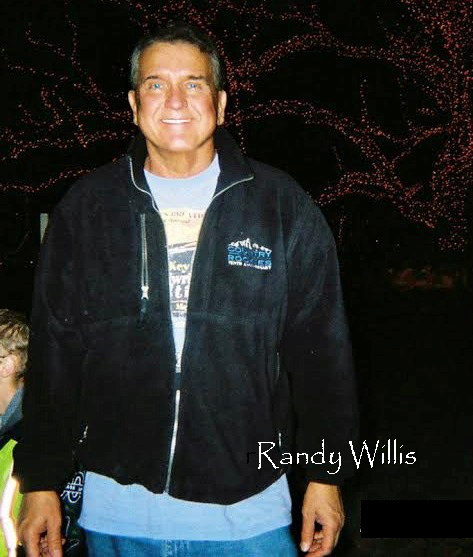
|
|
|
Randy Willis and Darrell Royal |
My friend Coach Royal died four years ago.
For many years I would have a pickin’ party at my home honoring Coach. He never missed one.
This is a photo taken at the last one, on March 13, 2011, at my Austin home. Pictured with me is: Rattlesnake Annie, Lenny Vaughan (Stevie Ray Vaughan’s widow), Coach Royal, and Freddy Powers (longtime songwriting partner of Merle Haggard).
He was famous for inspirational Royalisms like, “Dance with the one that brung ya,” “When you get into the end zone, act like you’ve been there before,” and “You’ve got to think lucky. If you fall into a mud hole, check your back pocket you might have caught a fish.” My favorite was: “The mark of a man is how he treats people who can never do anything for him.”
He had a great sense of humor, too. Once when we were shooting pool, after playing golf all day (at Bill McDavid’s home on Willie Nelson’s Cut-N-Putt Golf Course) the phone rang. Freddy Powers asked me to answer it because I was the closest to the phone. Coach said, “Randy, if that’s Edith tell her I’ll come home when I’m damn good and ready.” And before I could get the phone to my ear he added, “and tell her I’m damn good and ready right now.”
On October 12, 2012 (a few weeks before Coach’s death) Coach Royal recited “The Eyes of Texas” while the Kyle Family sang back up. Less than a month later The Kyle Sisters, would sing “The Old Rugged Cross” at his funeral at Coach’s request. He had also asked them to change the lyrics when they sang it, tweaking the line “So I’ll cherish the old rugged cross, till my trophies at last I lay down” to “till my burdens at last I lay down.” He added, “my trophies don’t mean much to me now.” Remarkably, his request was made with Alzheimer’s. Coach died on November 7, 2012, due to complications of Alzheimer’s disease.
Aaron Eckhart played Coach in the movie “My All American.”
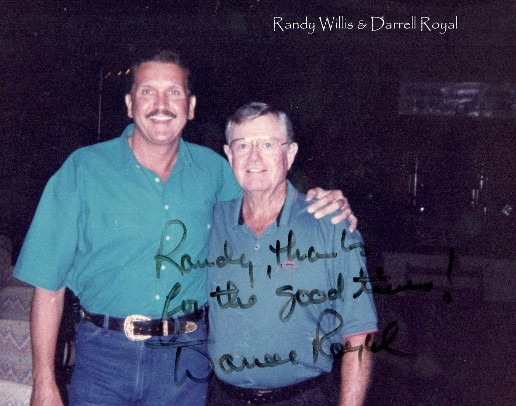
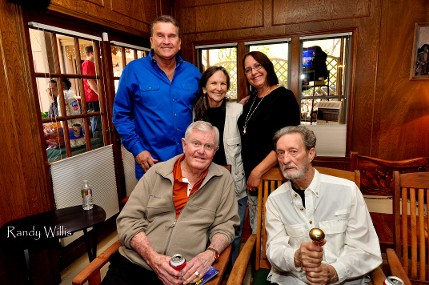
|
|
|
Randy Willis | Robert E. Lee |
When Robert E. Lee was two years old, his dad went to debtor’s prison.
After resigning from the U.S. Army, in 1861, Confederate General Robert E. Lee’s 200-acre Arlington estate, where he had married his wife Mary, raised seven children, and lived for over 30 years, was occupied by Union troops.
The government seized the property in 1864. Quartermaster General Montgomery C. Meigs recommended it as the location of a new military cemetery to be named Arlington National Cemetery. To ensure the house would forever be uninhabitable for the Lees, Meigs directed graves to be placed as close to the mansion as possible, and in 1866 he ordered the remains of 2,111 unknown Civil War soldiers killed on battlefields near Washington, D.C., to be placed inside a vault in the Lees’ rose garden.
General Lee would never return. Most men would have been bitter, but not General Lee.
Attempts to embroil Robert E. Lee in politics failed, though The New York Herald endorsed him for President in 1868 on the grounds that he was a much better man in every way than U.S. Grant. Lee refused.
After the Civil War, General Lee visited a Kentucky lady who took him to the remains of a grand old tree in front of her house. There she bitterly cried that its limbs and trunk had been destroyed by Federal artillery fire. She looked to General Lee for a word condemning the North or at least sympathizing with her loss.
After a brief silence, General Lee said, “Cut it down, my dear Madam, and forget it.”
Perhaps we all need to cut down a few trees today and forget them…?
~ Randy Willis
http://threewindsblowing.com
“Looking carefully lest anyone fall short of the grace of God; lest any root of bitterness springing up cause trouble, and by this many become defiled.” Hebrews 12:15 (NKJV)
photo: Arlington House, The Robert E. Lee Memorial, formerly named the Custis-Lee Mansion, is a Greek revival style mansion located in Arlington, Virginia, that was once the home of Confederate General Robert E. Lee.
The horse reminds me of Robert E. Lee's horse.
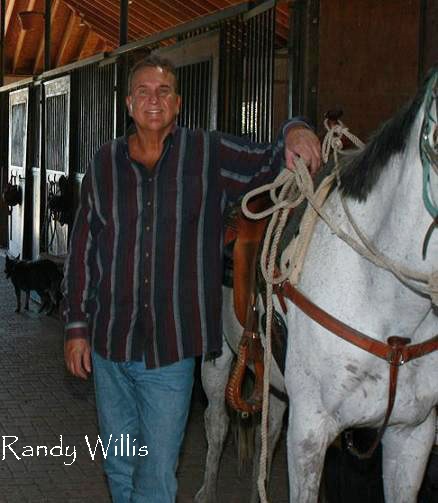
|
|
|
Randy Willis | Texas Baptist Children's Home |
|
|
|
2/3/17 |
Randy Willis | God swings a moghty big loop.... |
Randy Willis |God swings a mighty big loop....
“He bridled her and proceeded to rub the mare all over with a saddle blanket while he whispered to her. One ole cowboy yelled, ‘Bite her ear.’ Another, ‘Snub her to a post.’ Another, ‘She’s got crazy eyes.’
“Jimbo ignored them all, except to say, ‘She’s not crazy, just afraid.’
“Didn’t take long for him to get a saddle on her. He climbed on her real slow like and rode with a new found confidence. She seemed to trust him.
“Suddenly someone cracked a bullwhip and yelled, ‘Ride ‘em, cowboy.’
“She must have jumped ten feet. And, as everyone hooped and hollered she reared up falling over backward on top of Jimbo. The horse got up but not the boy. He just lay there in the dry dusty dirt. I was the first one that got to him and he sure didn’t look good. He tried to talk, so I bent down close to his mouth to hear his words.
“’Please get my Book, the one that boss Jake gave me.’
“First I thought I hadn’t heard him right, but he said it real clear again.
“’Please get me my Bible.’
“I sent one of the others to fetch it from his saddlebags. I tried to make him comfortable, but there wasn’t much I could do. Wondered how we’d explain all this to boss man Jake. When the Book arrived I show it to him. ‘Here, Jimbo, here’s your Bible.’”
“’Lay it on my chest and open it to John 3:16, please. Put my finger on those words.
“He spoke all raspy like.
“’Please, do it, please!’
“I found that verse and lifted his hand. He cried in pain cause his arm was broken. I placed his finger on the verse.”
“’Tell boss Jake I made that decision just like he told me I should.’
“With that he closed his eyes and was gone.” The barber had tears in his eyes as he ended the story.
? ? ?
I paused a minute, then said, “Boys, I made three decisions after I heard the barber’s story. The first was to name the creek we now live on Barber Creek. The second was to have you boys bury me one day with my Bible opened on my chest with my finger placed on John 3:16. And the third was to give every cowboy that works with us a copy of the good Lord’s Word. Your copies are in the chuck wagon. Rooster will show you where.”
Jeremiah and Jacob seemed to be moved the most.
Jeremiah spoke first, “Mr. Willis, our sister Mary told us about that Carpenter. Is He for real?”
“Boys, He’s as real as the skin on my bones.”
“What does that verse say Mr. Willis?”
“It says that whosoever puts his trust in Jesus will have everlasting life.”
“What does whosoever mean? Who’s that?”
“I reckon, Jeremiah, that’s you and me and every cowboy and cowgirl. Even the mavericks, the culls, and the undesirables. God swings a mighty big loop. But, there’s many a cowboy that doesn’t want His brand.”
There was a peace in the camp as an unseasonable cool breeze blew in.
Then Jeremiah said, “I want His brand.”
Jacob added, “Me, too.”
? ? ?
An excerpt from Louisiana Wind by Randy Willis
Available at :
https://www.amazon.com/Louisiana-Wind-novel-Randy-Willis/dp/1523210184
Amazon author's page:
http://amazon.com/author/randywillis
Vaya con Dios,
Randy Willis
Website: http://threewindsblowing.com
|
|
|
|
Destiny is now available on Amazon Kindle for only $2.99
For one week only
https://www.amazon.com/dp/B07ML1H5V8
#randywillis
|
|
|
June 1853
Steamboat Paul Jones
Two fathoms deep
Mississippi River, near Natchez
Joseph Willis had turned ninety-five in 1853. He decides to see the sights along the Mississippi River one last time. His swimming the mighty river on a mule-days are long since passed. This time he will travel on the Steamboat Paul Jones from Natchez to Baton Rouge. A cool breeze breaks up the unrelenting sun. Joseph places a wet towel around his neck to relieve the heat.
The steamboat passes another one loaded with convicts. Joseph sits on the main deck next to a seventeen-year-old boy whom the leadsman called Samuel. They both are watching the colossal paddle wheel churning the muddy waters when the boy turns to Joseph. "How do they navigate in these shallow waters? It looks unsafe!"
Before Joseph can answer, the leadsman throws a knotted rope overboard and yells, “Half twain! Quarter twain! M-a-r-k twain!"
"What does that mean, Mister?" The boy crosses his arms while pushing his glasses up.
Joseph leans forward. "It means it’s the second mark on the line, two fathoms—twelve feet deep. That’s the safe depth for this steamboat. We're in safe waters now."
Samuel waves an offering of thanks to the leadsman. He also opens up to Joseph, explaining how his father died of pneumonia when Samuel was eleven and how he dreamed of being a steamboatman.
“Tell me more, Samuel.”
“I wasn’t expected to live when I was born. My brother and sister had already died of childhood diseases. Mother said God spared me because He had plans for me. She made me remember Bible verses. I washed that down with Shakespeare and read everything I could. Mother insisted I never throw a card or drink a drop of liquor, although I did occasionally slip off and smoke my corncob pipe.
“I figured no one was perfect. That is, until a late night thunderstorm convinced me that God wanted me to mend my ways, so I put my pipe aside. My righteousness did not last long, for I developed an aversion to slavery. Our local pulpit said it was in the Bible that God approved of it. It was a Holy Institution.
"After seeing a dozen men and women chained together to be shipped down the river, I determined that the church and I worshipped a different God. Those slaves had the saddest faces I’d ever seen, and the slave traders were human devils. My Father never laughed, yet he never was as unhappy as those slaves. It all made me want my dream even more.”
"Tell me about that dream?"
Samuel’s eyes sparkle. "When I was a lad living on the banks of the Mississippi, in Hannibal, I could see the steamboats go up and down the river. I wanted to ride one. One day a big steamer moored up at our little town—this was my chance. After all, I’d already fished away the summer.
"The steamboat advertised it was a 'lifeboat'—I reckoned that meant it was safe and would provide the time of my life. I reckoned wrong—at least about the safe part! It was the kind of lifeboat that wouldn't save anybody.
"I became overjoyed to be on a real sure-enough steamboat, enjoying the motion of the swift-moving craft until it commenced to rain. When it rains in the Mississippi country, it rains. The rain drove me to cover. I realized it was not a lifeboat when the rain was almost my demise. I thought I would die as the red-hot cinders from the big stacks came drifting down and stung my legs and feet. Would I ever see my home again?
"For some reason, Mama's supper came to my mind. I expressed my desire to get off that boat. They put me ashore in Louisiana. I finally made it back home.
“Mister, please excuse me if I was a little edgy when the leadsman yelled mark twain. I thought it meant something bad."
"Just the opposite, son." With a slow smile, Joseph assures him they are safe.
Samuel raises his thick eyebrows. “Where you headed?”
“Only as far as Baton Rouge,” Joseph mutters, fanning himself from the heat with one hand. “Seven thousand people have died this year in N’Orleans from the yellow fever epidemic. I want to go to Heaven—but not today. Baton Rouge is far enough.”
“Your story of the lifeboat wrongly advertised reminds me of Louisiana's Governor Johnson.”
“How’s that, Sir?” Samuel asks, scratching his head.
“The good Governor got the great state of Louisiana to build the state prison in Baton Rouge. I’m considering visiting those inmates we passed earlier and tell ‘em about a real lifeboat.”
"What kind of boat is that, Mister?" Samuel gazes at Joseph.
"One built many years ago by a feller named Noah. His boat was mark twain, too—safe from the dangers that lurked in the murky waters below. That boat had no helm, for it was not guided by human hands."
“I love a good story, Sir. I fancy myself as a storyteller. Would tell me the rest of it?”
"Be glad to. God told Noah He was going to destroy the Earth because of its wickedness. But, God was also going to provide a way of protection from His judgment. The Lord told Noah to build a boat—a boat of safety, if you will. The Good Book says Noah found grace in the eyes of the Lord. That was the first time that word appeared in the Bible. Noah received the unmerited favor of God. Grace provided deliverance from the Lord’s judgment.
“Now there was a lot to be done. The Lord told Noah to build the boat out of gopher wood. We call it cypress in Louisiana. It will not rot in our lifetime.
“’Put pitch on the inside and outside too,’ the Lord insisted. The word pitch in the Hebrew means atonement. We need to be in Jesus just as Noah needed to be in that boat. As the storms of God’s wrath beat upon the ship, the winds of God’s wrath would later beat upon the Lord Jesus. If we are on the inside, not one drop of judgment can come through. We are sealed with that atoning pitch—Christ's atoning blood.
“It took Noah more than 100 years to build it. It takes a lot of faith in the Lord's promise to do that. The boat was built like an ancient coffin. There was no steamboat pilot to guide it—only God.
“The Lord gave precise instructions. ‘Set the door of the boat in its side.’ There was only one door to pass through to escape God’s judgment. Jesus is that one door.
"By faith, Noah and his family entered the boat. Once they were all inside, the Lord shut the door. God sealed the door—not Noah. ‘Put a window in the top of the boat, Noah, so you can look to Heaven for all your needs.’
“God had Noah build rooms in the boat. There is a room for me. There is room for you—for the asking.
"Noah's boat floated many days. It finally landed on Mount Ararat on the seventeenth day of the seventh month. That’s our April 17th—the same day Jesus rose from the grave. Noah went into the boat with little, but when he came out, the entire world was his."
"What is your name, Mister?"
"Joseph Willis."
"You should be a preacher."
Joseph smiles at the irony of that statement. "Grace provides our Salvation. Grace provides our Savior. Grace provides our security—grace keeps us. But, we all must choose to put our trust or not to put our trust in God's ark of salvation—Jesus. There's still room in that ark of safety.”
“I reckon Heaven goes by favor.” Samuel exhales. “If it went by merit, we would stay out, and our dogs would go in.”
“That’s a clever way to put it. You should be a writer.”
Joseph Willis died in 1854, at age ninety-six in his beloved Louisiana. Forever in the ark of salvation—Christ.
*****
#destiny by #randywillis
Destiny is a powerful epic with love stories, battles, testimonies, drama, politics, history, and even humor.
The sweeping family saga spans four centuries.
Inspired by true stories.
Available now at https://www.amazon.com/dp/1733567402 |
|
|
|
5/11/19 |
Randy Willis| Lady Bird Johnson |
The last time I saw Lady Bird Johnson was at the Headliners Club in Austin, Texas.
This inscription is on the inside cover of her book, Wildflowers Across America. She had it hand-delivered to me at my home in Austin.
The Texas bluebonnets in bloom this month remind me of her.
Photo of note to Randy Willis from three generations of President Lyndon B. Johnson's family: Lady Bird Johnson, Luci Baines Johnson, and Nicole Nugent Covert.
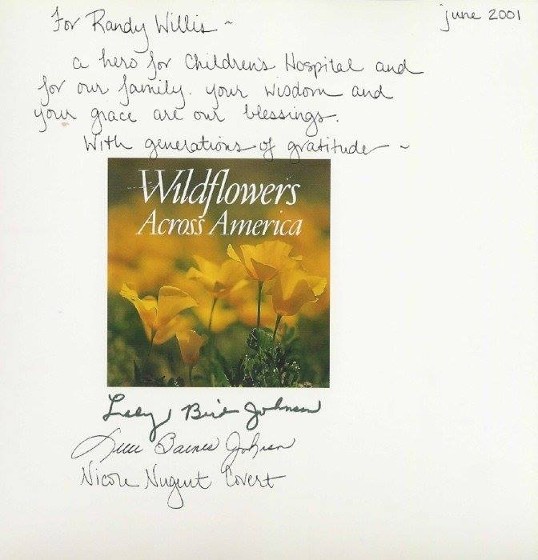
|
|
5/11/19 |
Randy Willis | George W Bush |
Letter from George W. Bush (43rd president of the United States) to Randy Willis.
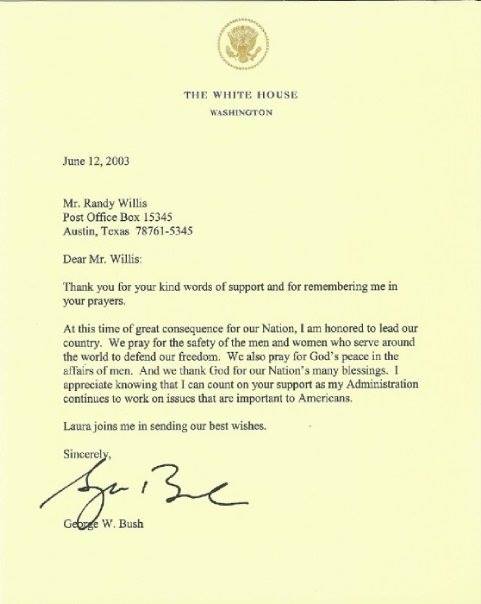
|
|
7/8/19 |
|
I've learned much from seeing the world through the eyes of my grandchildren, for you know, it is written, "the kingdom of heaven belongs to such as these." ~ Randy Willis
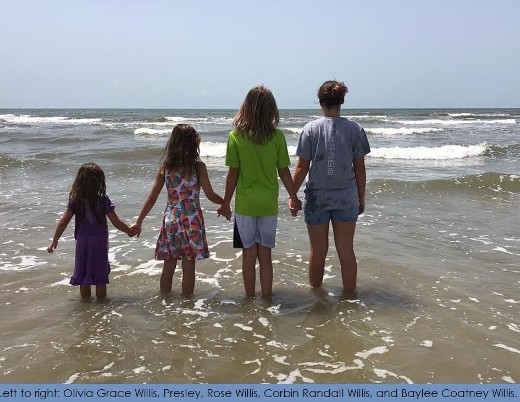
|
|
10/21/19 |
Bum Phillips, Earl Campbell, Randy Willis, and Tony Dorsett |
|
|
|
10/21/19 |
HEADLINE |
|
SUMMARY |
|
|
![]()
